
A major new study has added to a growing body of research highlighting the health risks associated with marijuana use—particularly its impact on heart function—reinforcing concerns long voiced by Christian medical professionals. As global support for recreational legalization expands and acceptance increases among Christians, some Christian leaders are urging caution, citing both emerging health data and biblical principles that call believers to sobriety and self-control, especially in protecting young people from non-medical use.
The June 2025 study published in Heart, a peer-reviewed journal of the British Medical Association, found that daily marijuana users are 34% more likely to develop heart failure than non-users. Drawing on data from over 150,000 U.S. adults tracked over several years, the study also linked marijuana use with an increased risk of heart attack and stroke.
Reporting on the study, The New York Times noted that marijuana is now the most widely used federally illegal drug in the U.S., with daily use particularly prevalent among men ages 18 to 44. Experts cited in the article expressed concern about the drug’s cardiovascular impact.
Dr. Matthew Springer, a heart disease biologist at the University of California, San Francisco (UCSF), commented to the Times that marijuana inhalation delivers “thousands of chemicals deep into the lungs,” potentially increasing cardiovascular risk. His lab recently found that both edible and inhaled forms of marijuana were associated with comparable levels of blood vessel dysfunction.
Complementing these findings, a March 2025 publication by the American College of Cardiology revealed that marijuana users under 50 are six times more likely to suffer a heart attack and three times more likely to die from cardiovascular causes compared to non-users.
Despite mounting clinical evidence of health risks, marijuana continues to gain legal and public acceptance in the U.S. and worldwide. Although it remains illegal at the federal level, marijuana has been legalized for recreational use in nearly half of U.S. states, contributing to its growing normalization and widespread use.
A 2024 PRRI survey found that 66% of Americans support legalizing marijuana in most or all cases, with support somewhat lower among White evangelical Protestants (56%) and less than half of Hispanic Protestants (39%). A 2021 Pew Research study, however, highlighted that support for legalization of marijuana was significantly lower among White evangelical Protestants who attend church weekly or more (29%) versus those who attend less than weekly (64%).
In 2019, the Christian Medical & Dental Associations (CMDA)—a U.S.-based nonprofit representing thousands of Christian healthcare professionals—issued a position statement cautioning against recreational marijuana use.
“[T]here is a need for limiting access to marijuana,” the CMDA said. It warned of addiction, cognitive impairment, psychosis, and long-term health effects, especially among youth. “The adolescent brain is still developing and more vulnerable to the adverse effects of marijuana,” the statement emphasized.
From a biblical perspective, Kevin J. Vanhoozer, research professor of systematic theology and contributor to The Gospel Coalition, comments that Christian discipleship calls for sobriety and alertness of both body and spirit. In his article titled Should followers of Christ use recreational marijuana?, he argues that while Scripture does not specifically mention marijuana, it consistently warns against intoxication and spiritual dullness. “[M]arijuana clouds our ability to perceive the world clearly and dulls our sense of urgency about what disciples should be doing,” Vanhoozer writes.
Marijuana use extends well beyond North America, with changing laws and shifting social attitudes increasing access across Europe, Africa, Latin America, and Asia. According to the 2024 UN World Drug Report, an estimated 228 million people worldwide used cannabis in 2022, making it the most commonly used drug among the 292 million total drug users globally—a figure that has risen by 20% over the past decade.
Though the Heart study primarily analyzed U.S. data, it draws on international research to provide global context. This includes cohort studies from Europe examining cardiovascular outcomes linked to cannabis use; early recreational legalization experiences in Canada; rising use across Latin America; and limited but growing data from Africa and Asia. The study suggests that the biological effects of cannabis on heart health—such as elevated heart rate and blood pressure—are likely consistent across populations.






